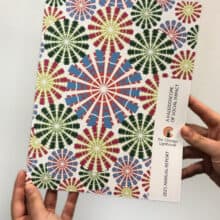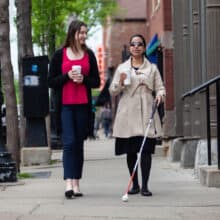Commentary: Responding to People Who Call Those with Disabilities ‘Inspirational’
One of the remarks people with disabilities often get from the general public is that we are ‘inspirational’. I have noticed this happens more often to people with visual or physical disabilities, and is something that many of us dislike. While I do not like it when someone calls me an inspiration simply because they see me doing everyday things, I completely understand where they are coming from.
It’s not that people want to offend those of us with disabilities in any way, but rather they cannot imagine how it would be to live – in this case – without sight. In fact, a recent study showed that Americans fear blindness more than cancer or other life-threatening diseases. There is no doubt that out of all the senses, sight is the one used the most by human beings. It is no wonder then that many people are amazed when they encounter someone like me who can’t see doing everyday things.
I recently got asked how I respond to these comments from well-meaning individuals. Truth is, there is no specific answer, and it all depends on the situation at hand. There have been times when even acquaintances who have known me for a long time tell me I am an inspiration for doing things like going to work, taking public transportation, etc. I thank them, and politely try to educate them on the different tools and techniques that help me do these and other things. Thanks to assistive technology, for example, I can be as successful at work as my colleagues with sight.
Often, it is strangers who tell me I am their inspiration. Once, a college advisor whom I had just met told me I was his ‘hero’ simply because I showed up to class on my own. Rather than saying anything, I just smiled. He was my soon to be academic advisor, and I certainly did not want to start off our relationship on a bad note! Other times, people have randomly approached me on the street to tell me I am their inspiration. Since most of these times I am in a hurry and don’t have time to stop and talk, I simply thank them and move on.
This is not to say that people with disabilities cannot be an inspiration to us. Erik Weihenmayer, for instance, was the first person who is blind to reach the summit of Mount Everest. David Paterson, governor of New York from 2008-2010, was the first legally blind governor in the United States. There are countless other examples of blind people who have overcome their disability to achieve great things. We’ve had blind musicians, judges, attorneys, astronomers, radio announcers and many other career categories. To me, these individuals qualify as truly inspirational because they excelled in challenging occupations that are difficult for sighted people to succeed in, let alone those of us who are blind, visually impaired or otherwise disabled.
For many of us with disabilities, being called ‘inspirational’ is a common occurrence. While I appreciate that people have the best intentions in mind, individuals with disabilities do not want to be seen as courageous or inspirational simply because of doing everyday things. While it is true that many of us have had to overcome certain challenges, we have also learned to be independent in our everyday lives, just like anyone else. I hope that one day more people will say I am inspirational because of my talents and professional accomplishments, not because of my disability.
For more tips, read my previous post about language suggestions for referring to people with disabilities. Have you been called ‘inspirational’ because of your disability? How do you respond to these remarks? Special thanks to our reader who asked me this important and thought provoking question!

Sandy Murillo works at The Chicago Lighthouse, an organization serving the blind and visually impaired. She is the author of Sandy’s View, a bi-weekly Lighthouse blog about blindness and low vision. The blog covers topics of interest to those living with blindness and vision impairments. Being a blind journalist and blogger herself, Sandy shares her unique perspective about ways to live and cope with vision loss.





